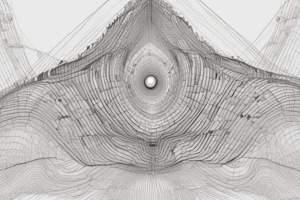Podcast
Questions and Answers
What is the key difference between continuous probability distributions and discrete probability distributions?
What is the key difference between continuous probability distributions and discrete probability distributions?
- Continuous probability distributions only apply to measurements, while discrete probability distributions apply to counts.
- Continuous probability distributions have an infinite number of values within a range, while discrete probability distributions have a countable number of possible values. (correct)
- Continuous probability distributions always result in a symmetrical distribution, while discrete probability distributions may be skewed.
- Continuous probability distributions can only be approximated, while discrete probability distributions are exact.
Which of the following represents an example of a continuous random variable?
Which of the following represents an example of a continuous random variable?
- The number of students in a classroom.
- The weight of an individual. (correct)
- The number of heads obtained when flipping a fair coin.
- The color of a car in a traffic jam.
What defines a uniform probability distribution for a continuous random variable?
What defines a uniform probability distribution for a continuous random variable?
- A bell-shaped curve with equal probabilities for all values.
- A distribution that has no limits on the possible outcomes.
- A distribution that is defined by minimum and maximum values with equal probabilities for each value within the range. (correct)
- A distribution where extreme values are more likely than the mean values.
In a uniform probability distribution, what can we say about the likelihood of the extreme values compared to the middle values?
In a uniform probability distribution, what can we say about the likelihood of the extreme values compared to the middle values?
Which variable is considered continuous in the context of the uniform distribution example provided?
Which variable is considered continuous in the context of the uniform distribution example provided?
How does a continuous random variable differ from a discrete random variable?
How does a continuous random variable differ from a discrete random variable?
Why is it important to understand that continuous random variables have an infinite number of values within a given range?
Why is it important to understand that continuous random variables have an infinite number of values within a given range?
Which feature characterizes a uniform probability distribution?
Which feature characterizes a uniform probability distribution?
Why does the concept of an infinite number of values matter in continuous probability distributions?
Why does the concept of an infinite number of values matter in continuous probability distributions?
Flashcards are hidden until you start studying





